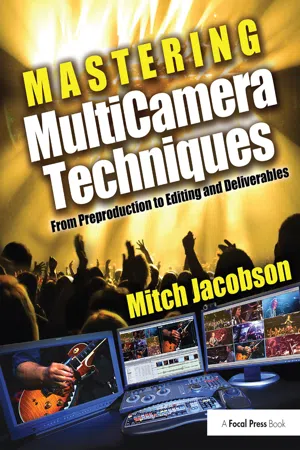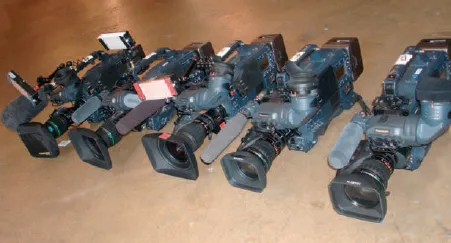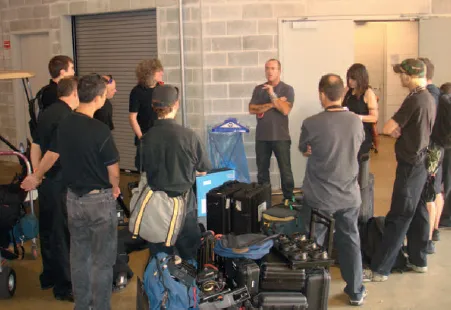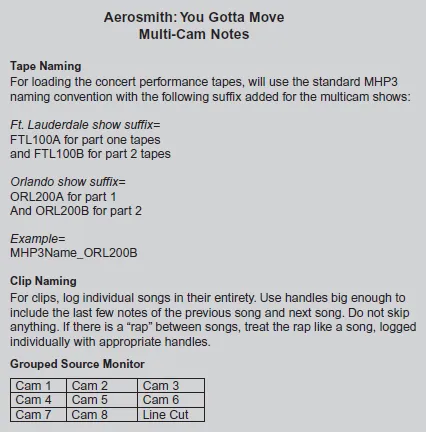
eBook - ePub
Mastering Multi-Camera Techniques
From Pre-Production to Editing to Deliverable Masters
- 240 pages
- English
- ePUB (mobile friendly)
- Available on iOS & Android
eBook - ePub
Mastering Multi-Camera Techniques
From Pre-Production to Editing to Deliverable Masters
About this book
From a basic two-camera interview to an elaborate 26 camera HD concert film, this comprehensive guide presents a platform-agnostic approach to the essential techniques required to set up and edit a multi-camera project. Actual case studies are used to examine specific usages of multi-camera editing and include a variety of genres including concerts, talk shows, reality programming, sit-coms, documentaries for television, event videography and feature films. Other features include:
* Advanced multi-camera techniques and specialty work-flows are examined for tapeless & large scale productions with examples from network TV shows, corporate media projects, event videography, and feature films.
* New techniques for 3D projects, 2k/4k media management and color correction are revealed.
* Technical breakdowns analyze system requirements for monitoring, hard drives & RAIDs, RAM, codecs and computer platforms.
* Apple Final Cut Pro, Avid Media Composer, Adobe Premiere Pro and several other software programs are detailed.
* Tables, charts, screen-grabs, photos, web-links, blogs, tech school lists and other resource tools for further study.
* Unique interviews with the 'Masters of Multi-Cam' including EMMY and academy award-winning directors and editors who share their project notes and give insight to award-winning techniques.
Frequently asked questions
Yes, you can cancel anytime from the Subscription tab in your account settings on the Perlego website. Your subscription will stay active until the end of your current billing period. Learn how to cancel your subscription.
No, books cannot be downloaded as external files, such as PDFs, for use outside of Perlego. However, you can download books within the Perlego app for offline reading on mobile or tablet. Learn more here.
Perlego offers two plans: Essential and Complete
- Essential is ideal for learners and professionals who enjoy exploring a wide range of subjects. Access the Essential Library with 800,000+ trusted titles and best-sellers across business, personal growth, and the humanities. Includes unlimited reading time and Standard Read Aloud voice.
- Complete: Perfect for advanced learners and researchers needing full, unrestricted access. Unlock 1.4M+ books across hundreds of subjects, including academic and specialized titles. The Complete Plan also includes advanced features like Premium Read Aloud and Research Assistant.
We are an online textbook subscription service, where you can get access to an entire online library for less than the price of a single book per month. With over 1 million books across 1000+ topics, we’ve got you covered! Learn more here.
Look out for the read-aloud symbol on your next book to see if you can listen to it. The read-aloud tool reads text aloud for you, highlighting the text as it is being read. You can pause it, speed it up and slow it down. Learn more here.
Yes! You can use the Perlego app on both iOS or Android devices to read anytime, anywhere — even offline. Perfect for commutes or when you’re on the go.
Please note we cannot support devices running on iOS 13 and Android 7 or earlier. Learn more about using the app.
Please note we cannot support devices running on iOS 13 and Android 7 or earlier. Learn more about using the app.
Yes, you can access Mastering Multi-Camera Techniques by Mitch Jacobson in PDF and/or ePUB format, as well as other popular books in Media & Performing Arts & Film & Video. We have over one million books available in our catalogue for you to explore.
Information

PREPRODUCTION

PREPRODUCTION
Whether you are a producer, director or editor working on a multicamera project, the first place to start is in preproduction.
The edit process starts in preproduction. We'll talk an editor through what I'm planning to do, what angles I've got, and how many nights I'm shooting.
Hamish Hamilton, director*
Preproduction is the foundation of a multicam shoot—it's when many decisions that will directly affect postproduction editing are made. Furthermore, knowledge is power: the more a multicam editor knows about each production phase, the more influence that editor will have when talking to producers and directors about the edit itself. Additionally, there are more opportunities for editors on the set than ever before—not only as a preproduction consultant but as an editor in the field, in the truck, and on the go—but only if you have a measurable knowledge base, an appreciation for your colleagues’ roles, and a dedication to organized planning. Know what you want and plan for it. This is the preproduction mantra.
Preproduction planning is critical to a shoot's successful edit. A poorly planned shoot can wreak havoc on the editing phase, especially when multiple cameras are involved. You can waste hours hand-syncing shots, trying to make up for a missing time-code, sorting through cameras that don't roll concurrently, and so on. Multicam shoots are by nature more complex, and not just because there are more tapes in post! Every aspect of a multicam shoot is multiplied: disks, drive space, crew, gear—and it all needs to be organized at the outset. Savvy directors will consult their editors ahead of time, and ask technical questions about how to use timecode, the best method for tape numbering, which way to set up a project, and what types of codecs should be used in shooting or in formatting edits and deliverables. Smart directors will also ask about high-definition video formats, drive space requirements, and backup solutions. Why? Because they know that a well-planned shoot will save precious time and probably also money in postproduction. In other words, preproduction can make the difference between a project that goes smoothly and the gig from hell.
© 2010 Mitch Jacobson. Published by Elsevier Inc. All rights reserved.
Doi: 10.1016/B978-0-240-81176-5.00004-6
Doi: 10.1016/B978-0-240-81176-5.00004-6
Organization
To prepare for multicam editing, you must have an understanding of the actual needs of a multicam shoot. As in any type of production, organization is key, but for multicam it is paramount—and not just for big jobs. All multicam jobs benefit from organization.
Organization is the key to creativity.
Mark Raudonis
Mark Raudonis is the vice president of postproduction at Bunim-Murray Productions, which effectively invented reality TV in the early 1990s when it came out with The Real World for MTV. Today, Bunim-Murray Productions, generates almost 4,000 hours of videotape per show each season. Some scenes may use up to 12 or more cameras, so without the proper preparation, a shoot can easily dissolve into chaos. And it's not just the shoot itself that can fall apart. Raudonis says, “The entire post process is at risk.” If you're wasting time searching for footage,” Raudonis says, “you're not being creative. Less time searching equals more time editing. More editing means being able to try several different options in a given time period. This is why organization is the key to creativity.”
Tim Leavitt is an assistant editor on The Apprentice:
We had over 3,000 takes, so obviously you've got to keep that super organized to be able to find anything at any time, exactly when you or the editor needs it. So we create separate projects for each episode, and we give the editors the media they need for that episode.
The power of an organized workflow is a value that successful producers of all genres share. Meredith Lerner is a multiple Emmy Award-winning producer who has worked on productions ranging from the Olympics and The Rachael Ray Show to the HGTV show Destination Design. To make the entire process a smooth one, Meredith Lerner says it's vital to have a clear plan before you go on location or even pick up a camera:
So many things come up in the field, and when you're not prepared it can completely put you behind schedule. It can really cause problems once you're back in the edit room with your footage and you realize there aren't shots that you need. When you're organized, then everyone on the crew will know what you need to achieve.


Figure 1.1b Preproduction meeting with director MarkHaefeli. (Courtesy Mark HaefeliProductions/www.mhp3.com.)
Chris Halasz, workflow supervisor at Livecut in Vienna (www.livecut.at), specializes in unique multicamera workflows and software solutions. Halasz says, “It's best for me to get involved at the preproduction phase.” If you're an editor and you're on your game, your knowledge of the technology involved and how it's changing can help everyone avoid nasty surprises in the editing suite.
The Editor's Role in Preproduction
Some of the important preproduction elements an editor should consider to maximize the cost-effectiveness of editing are type of show, equipment testing, prelabeling and numbering media, and the formation of a timecode plan.

On Different Types of Shows
Concerts are different from reality shows and reality shows are different from sitcoms. A dramatic or comedic production like a sitcom is organized so you can stop, back up, and try a second, third, or fourth take. The director has blocked it all out and knows exactly where everyone needs to be, down to a specific line of dialogue and which camera will be on that actor at any given time. You're still on the high wire, but you're performing over a net. Reality shows, however, are part run-and-gun and part studio. And concerts tend to run the gamut from scripted to more fluid, in a sense directed by the music. When dealing with a live show, which can be an unpredictable circus from start to finish, you don't get a second shot. You need to be thinking about how to cover all of your bases from square one.
Preproduction for remote truck shows needs to be even more detailed. Eric Duke, owner of All Mobile Video, asks all the questions one would expect from the nation's best remote TV truck company: “How many cameras and tape machines do we need? Do we have sufficient crew?” And once he has the answers to those questions, he asks, “How do we cost out the job based on our requirements? How many days will it take? What format (high definition [HD] or standard definition [SD])? Will it require additional formats, too—ones we don't...
Table of contents
- Front Cover
- Title Page
- Copyright
- Dedications
- Contents
- Acknowledgments
- Category-5 Publishing Credits
- Foreword
- Introduction
- Part 1 Preproduction
- Part 2 Production
- Part 3 Timecode and Sync
- Part 4 Postproduction
- Part 5 Editorial
- Part 6 Deliverables
- Part 7 Multicamera Madness® Case Studies
- Appendix 1 Interviewee List and Bio Info
- Appendix 2 Companion DVD Contents
- Index